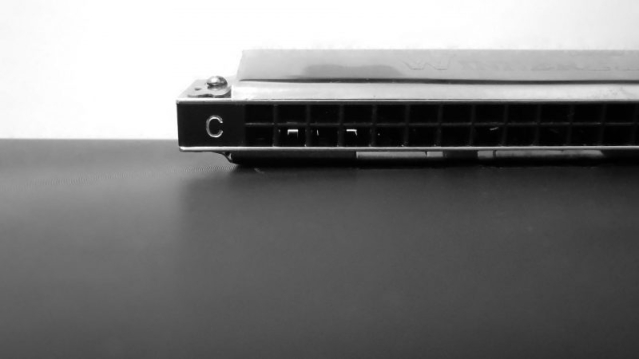Oct
30,
2023
Did you know that the harmonica has been around for centuries, yet it's one of the most underappreciated instruments out there? It's true. While ...

There are really 3 main types of harmonicas:
Now let’s see which harmonica keys are best for each type of harmonica!
For the diatonic harmonica, the logical order is :
First, get a harmonica in C. C is the best key to get started because the length of the reeds is average and it's also the most common key in music. Out of all 12 keys a diatonic blues harmonica in G has the longer reeds and a harmonica in F# has the shortest reeds, and C is right in the middle for reed length. A C harmonica allows you to play easily in the key of C as well as play bluesy tunes in G and D.It is also one of the best options to play in all 12 keys on a single diatonic harmonica if you learn how to bend and overbend.
The next keys recommended for intermediate players are Harmonica in A, D, and G. Those keys are the most common harmonica keys used in Blues, Country-Music, Folk, and Rock (along with the C).
Once you have those 4 harmonica keys C, D, G, and A you can extend the collection to Bb and F (or Low F when available).
The Bb harmonica is a very good choice for jazz standards as most of them were written and played on Bb instruments such as the Trumpet and Tenor saxophone. Low F will allow you to play low tones on a C blues.
Then harmonicas in the key of E and B can prove useful in some Blues, Country, and Pop/Rock contexts to play in B and F#.
Last but not least harmonicas in Db, Ab, Eb, and F# are much less common and needed but they can be great for some Jazz and Swing tunes or Blues songs in Ab, Eb, Gb, B, and Bb. They are also the keys you will need if your guitar player tunes his guitar a half step down which is very common in Blues rock bands.
Here are some popular diatonic harmonica models that come in all 12 keys:
For the chromatic harmonica player, the key of choice is C that's the one you'll hear 95% of the time. On the chromatic harmonica, it is easier than on a diatonic to play in all 12 keys on single harmonica since you can get all the sharps and flats by pushing the slider.
Next in line would be a G chromatic harmonica if you play Celtic music or are looking for a lower range than C.
Low C is great if you don’t use the high register so much or if you want the low range of a 16-hole without the 4 top high notes.
Then a Bb chromatic harmonica is perfect for the saxophone and Jazz buff.
Most Jazz standards were written for trumpet and saxophone that are tuned in Bb so a Bb harmonica will make these tunes somewhat easier to play.
Models that come in those keys:
Harmo Angel 12 – one of the best all-around budget-friendly chromatic on the market comes in C, D, G, A, Bb, and Low C
Suzuki SCX48 : very similar to the Angel 12 it comes in C, D, F, G, A, and Bb
The Hohner Chromonica 270 – a classic chromatic harmonica that comes in all 12 keys
The Hohner CX12 black : An all-plastic comb / cover chromatic model with a modern sound comes in 10 keys
Seydel Saxony – a High-end aluminum comb chromatic harmonica
Seydel De Luxe steel is a great acrylic comb all-around model.
Other keys you can get for a chromatic harmonica:
A, D, F, and E are great for harmonica enthusiast who plays Folk and World music
Ab, Db, B, and F# would be the least common keys but great to complete your collection
Some models come in low keys as well – check out the Seydel chromatic models Saxony and De Luxe Steel.
Note that 14 and 16-hole chromatic harmonicas are only available in C as their goal is to extend the range of the instrument in the low register.
Again the most standard key for a tremolo harmonica is the key of C.
Tremolo harmonicas can really only be played in the key they come in
C is the most common key in music so C would be the best option to get started.
Some classic models like the Hohner Echo 2309 and the Echo 2509 .
The next keys that would be the most popular for double-row harmonicas are in this order: G, D, A
Several brands make tremolo harmonicas in these keys, check out the Seydel Sailor Steel, Seydel Concerto, Seydel Skydiver
Hohner makes a double-sided model that plays in C on one side and G on the other side, it’s the Hohner Echo 54/64 and the Hohner Echo 56/96
But if you really need more keys and tuning to play tremolo the Suzuki SU-21H is the best option since it comes in all 12 keys as well as in minor tunings.
After the key of C, D, G and A other keys that could be interesting are E, F, C#, or Db - to alternate with C and get a chromatic scale while using 2 harmonicas.
Then the keys of Bb, Ab, Eb, and F#
For minor Cm, Dm, Em, and Am will be the most popular ones.
A popular item for harmonica keys is Harmonica stickers:
Most harmonica models are laser labeled on the side of the comb which makes it impractical in live situations. You can relabel the side of the comb with 3D stickers that are easier to spot or why not label the top covers with 2D stickers that make it very easy to see?
Comments :